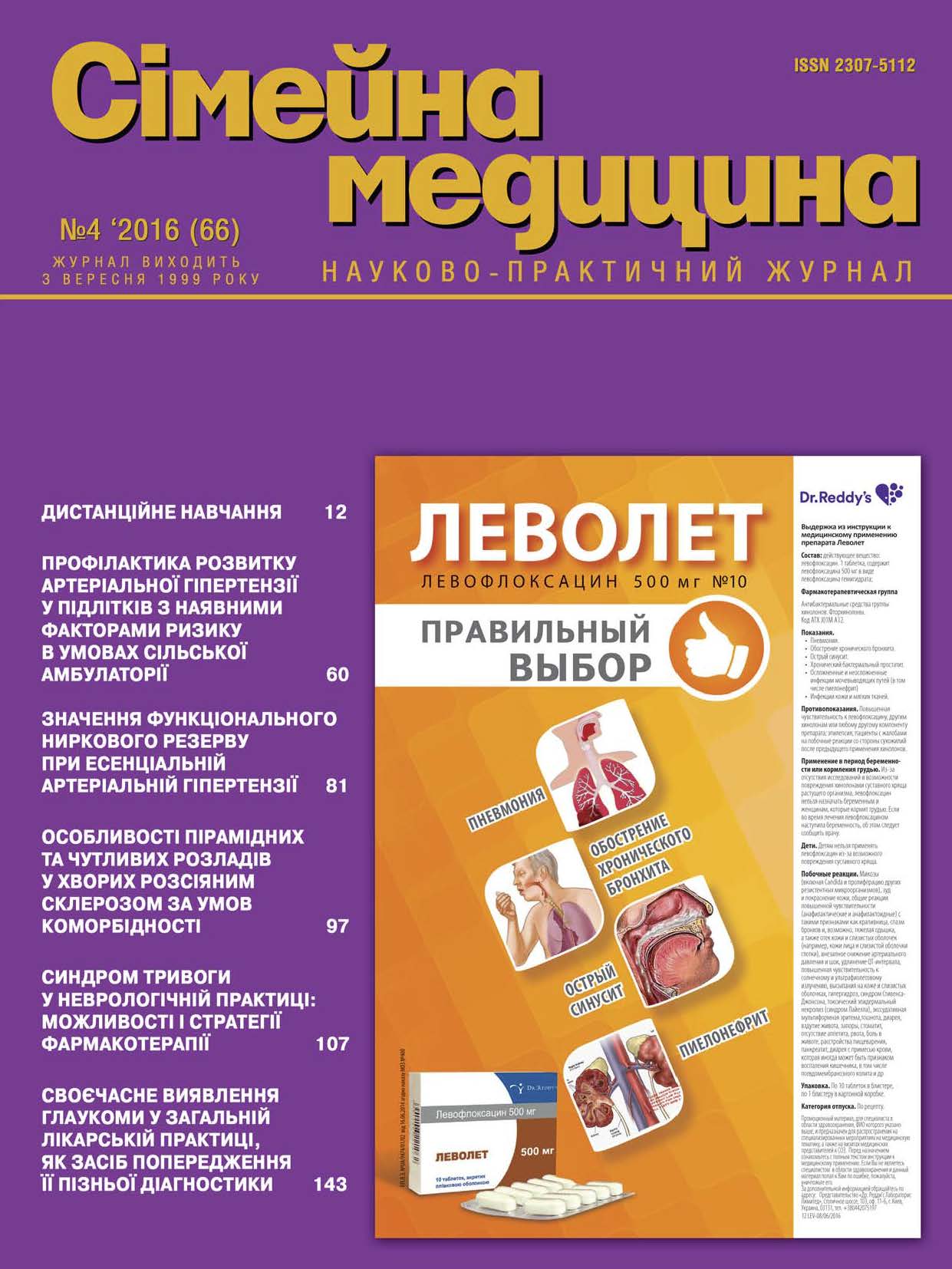Use of Ethylmethylhydroxypyridine in Patients Presenting with Myocardial Infarction: Antiischemic, Antidepressant, Anxiolytic Effects
##plugins.themes.bootstrap3.article.main##
Abstract
The objective: to evaluate the efficiency of ethylmethylhydroxypyridine (Mexiprim, STADA Arzneimittel AG, Germany) in patients presenting with myocardial infarction at hospital and outpatient stage.
Patients and methods. The study included 59 patients with coronary artery disease, acute coronary syndrome with ST1segment elevation in the first day of admission to the ICU, AH, 3-stage, 2 degrees, HF. To all patients basic therapy according to current ESH/ESC guidelines was prescribed. To 39 patients additionally intravenous infusion of 200 mg of mexiprim o.d. for 10 days, followed by 125 mg per os three times a day for next 60 days was administered. Another 20 patients presented control group and received only basic therapy. The study design included: 24-hour Holter monitoring to estimate the dynamics of changes in the ST segment, cardiac arrhythmias and heart rate variability, evaluation by the scale of Beck, Hamilton scale for the assessment of anxiety (HARS) and depression (HDRS), the common blood and urine tests, biochemical blood analysis, evaluation of therapeutic tolerability conducted before treatment and 60 days after treatment. Surveys on a scale SAN, assessment of cognitive impairment on the MMSE scale were performed on the 60th day of treatment. Efficiency criteria were: a 50% reduction of cardiac arrhythmias, a decrease in ischemia, a decrease by 50% or more from baseline average score by HARS, HDRS scales, dynamics of the mental state questionnaire and less than 9 points on a scale of depression, reducing in SAN scale score.
Results. In pаtients of mexiprim group significant reduction of depression scores by 62% were observed. According to the dynamics of the mental state questionnaire patients of mexiprim group reported feeling better, that is, reduction of score by 45% . According to the Hamilton scale for the assessment of anxiety (HARS), in particular mental anxiety – decrease in the total score of 65%, somatic anxiety – by 35.5%, and a total of 50% were revealed. In the group of patients receiving additionally intravenous Mexiprim for 10 days significantly reduced the number of single and group PACs, as well as single and multiple PVCs, not only in comparison with these parameters before the treatment, but also in comparison with the control group. In patients treated with Mexiprim no evidence of residual ischaemia were noted, but in the control group statistically significant segment depression ST remained. Heart rate variability was not significantly changed in the control group, but increased in patients who received Mexiprim.
Conclusion. Use of Mexiprim in patients with myocardial infarction reduces ST segment depression, amount of ventricular and supraventricular arrhythmias, improved heart rate variability, and the state of anxiety and depression.
##plugins.themes.bootstrap3.article.details##

This work is licensed under a Creative Commons Attribution 4.0 International License.
Authors retain the copyright and grant the journal the first publication of original scientific articles under the Creative Commons Attribution 4.0 International License, which allows others to distribute work with acknowledgment of authorship and first publication in this journal.
References
Pajak A., Jankowski P., Kotseva K. Depression, anxiety, and risk factor control in patients after hospitalization for coronary heart disease: the EUROASPIRE III Study // European Journal of Preventive Cardiology April. – 2013. – Vol. 20. – № 2331-340.
Time Trends in Lifestyle, Risk Factor Control, and Use of Evidence-Based Medications in Patients With Coronary Heart Disease in Europe: Results From 3 EUROASPIRE Surveys, 1999-2013. Kotseva K, De Bacquer D, Jennings C, Gyberg V, De Backer G, Rydйn L, Amouyel P, Bruthans J, Cifkova R, Deckers JW, De Sutter J, Fraz Z, Graham I, Keber I, Lehto S, Moore D, Pajak A, Wood D; EUROASPIRE Investigators. – Glob Heart. 2016 Mar 16.
Коваленко В.М., Долженко М.М., Несукаи О.Г., Нудченко О.О., Лурьє С.З. на чолі групи дослідників. Поширеність тривожно-депресивних розладів та їх вплив на серцево-судинні фактори ризику за даними дослідження EUROASPIRE IV – Первинна ланка медичної допомоги // Укр. кард. журнал. – 2015. – С. 11-15.
Долженко М.М., Нудченко О.О., Лурьє С.З., Шершнева О.В., Сорока І.М., Д’яченко Я.С., Кравченко Г.В.. Вплив наявності тривожно-депресивних розладів на модифікацію способу життя за даними дослідження EUROASPIRE IV – Первинна ланка медичної допомоги // Укр. кард. журнал. – 2015. – Дод. 1. – С. 199.
Мексидол: применение препарата при остром нарушении мозгового кровообращения. – М.: Фармсофт, 2000. – 13 с.
WORLD MEDICAL ASSOCIATION DECLARATION OF HELSINKI. Ethical Principles for Medical Research Involving Human Subjects. WMA, 2004 (ХЕЛЬСИНСКАЯ ДЕКЛАРАЦИЯ ВСЕМИРНОЙ МЕДИЦИНСКОЙ АССОЦИАЦИИ. Этические принципы для медицинских исследований с привлечением человека в качестве субъекта).





